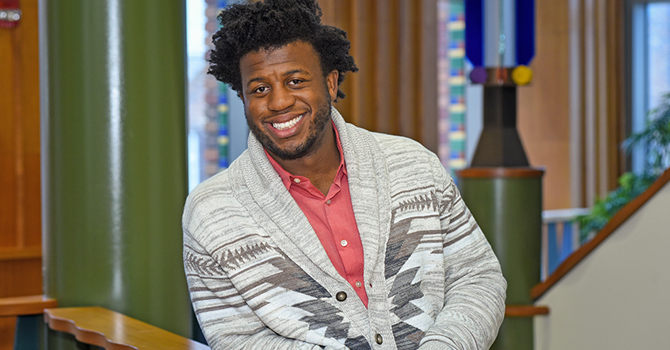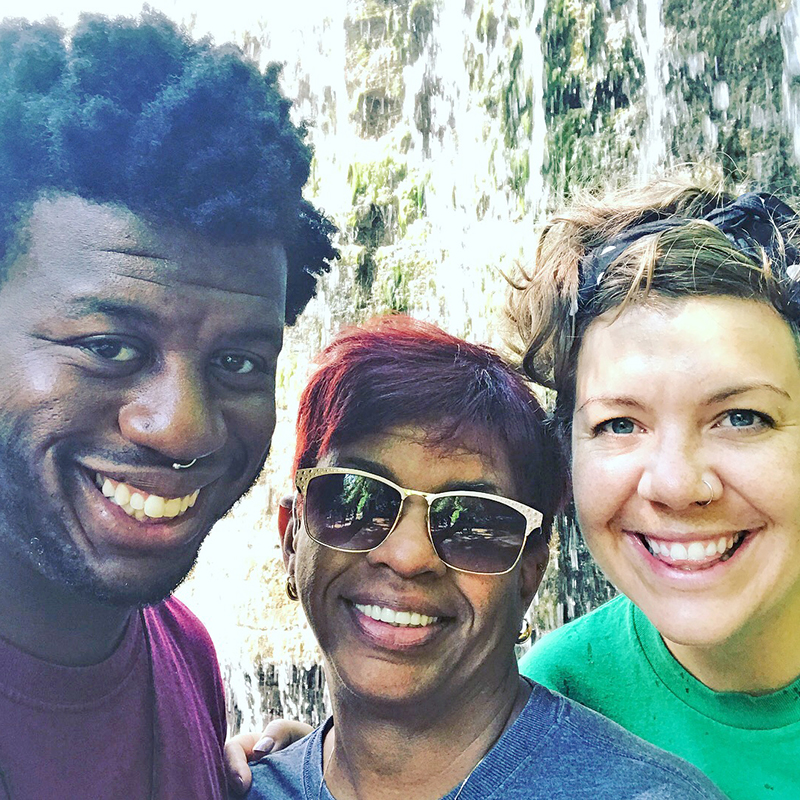Liberation through Public Health

Gabriel Lee Johnson
MPH Candidate, Health Behavior and Health Education
"Closed mouths don't get fed." It's something I grew up hearing. But what happens when someone refuses to feed another no matter how wide open their mouth is?
I learned this lesson early in life growing up in St. Paul, Minnesota, as a child of a deaf adult (CODA). I had to interpret instead of translating—an important distinction as I helped my mother navigate jobs, food stamps, and other institutions. I also found myself questioning the lack of interpreters for my mother when she went to medical appointments, realizing the challenges she faces navigating the world as a black, deaf woman from a low-income background.
Once I graduated high school, I attended the University of Minnesota for one year. After working full-time to assist my mother and trying to navigate the disorienting nature of a large university as a first-generation, black student, I was ultimately academically suspended from the University of Minnesota and did not return or reapply.
Eight years later, I was pursuing a bachelor's degree in economics at the University of California, Davis. Fixed on pursuing a future in economics, my mother almost losing her life altered my academic path. During my mother's time in the hospital, she had no interpreter or assistance handling financial obligations. Due to her lack of resources and support, I flew back to Minnesota to interpret for her as she went through recovery at the hospital and to handle any other obligations. As I interpreted for my mother throughout the recovery process, the inaccessible language used by doctors and nurses illuminated the challenges my mother and many others face as deaf individuals within the health system. Meanwhile, I continued pursuing my degree in economics.
Halfway through my first year at Davis, I began learning about public health through a doctor at a black-centered clinic where I was volunteering. Soon after, I went to Durban, South Africa, for the summer to be an HIV counselor. I counseled 50–90 patients a day. The entire summer, I saw only 10 men at the clinic in total. That experience, along with witnessing a queer young Zulu man get chastised for his sexuality by a fellow HIV counselor, cemented my desire to pursue a career in public health, specifically working with my community, black people.
Following graduation, I taught seventh-grade mathematics. After every lesson plan I developed and taught, I thought about the future implications on my students' health, inching me closer to applying for a master's degree in public health.
The vision of my students crying and the conversation that followed is why I am pursuing mental health for queer, black men. We see little representation of queer, black men in academia and research where they do not have HIV, STIs, or risk associated with them. I will help to change this.
An experience I had at the school where I taught still motivates me today. One day while grading papers after school, I looked out my window to see four of my students from the LGBT club I facilitated crying. One of them explained to me that another one of my students had attempted to kill themself in the bathroom and was still there. I ran over to the bathroom, took the student out, and brought them to my classroom. Unclear of what to do, I sat them down, and we talked about what was going on. Finally, I called their guardian and explained what had happened and that they had to be taken in for a 72-hour evaluation. The vision of my students crying and the conversation that followed is why I am pursuing mental health for queer, black men. We see little representation of queer, black men in academia and research where they do not have HIV, STIs, or risk associated with them. I will help to change this.
My mother, my students, and my time in Durban all contribute to the public health lens in which I view the world. Public health is personal—feeding open mouths, fighting by the side of those made invisible, and improving mental health. Because of that, I go into this field focused on liberation.

Johnson on a hiking trip with his mother and fiancée.
This article first appeared in the spring 2018 issue of Findings, the magazine of the University of Michigan School of Public Health.
